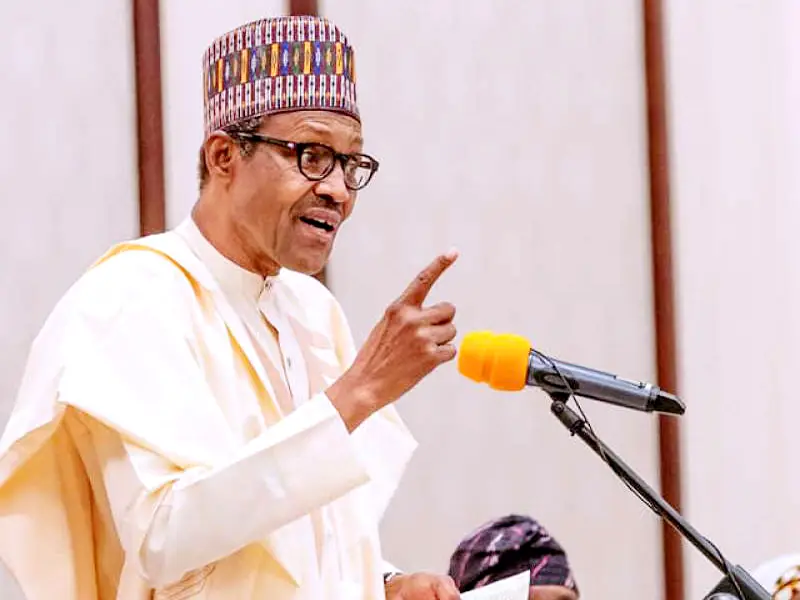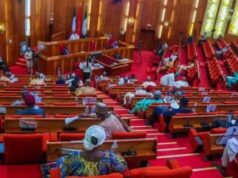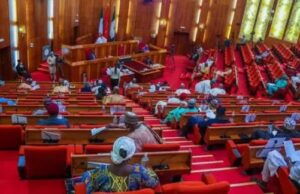President Muhammadu Buhari, on Monday, maintained that delay in the dispensation of justice, as well as the rising number of cases pending in various courts across the federation, have remained a subject of grave concern to his administration.
President Buhari, while declaring the 2021 All Nigeria Judges’ Conference of the Superior Courts, open in Abuja, said there was a need for the judiciary to evolve strategies that would enhance the justice delivery system in the country.
In his speech that was read by the Vice President, Prof. Yemi Osinbajo, SAN, Buhari stressed that Nigeria would not be able to attract foreign investors if its justice system is seen as “inefficient and ineffective”.
He said the extent to which the country could attract business, partly depends on investors’ perception of the quality of its justice system.
Consequently, aside from urging the judiciary to weed out bad eggs within its fold that could undermine its integrity both locally and internationally, President Buhari, said there was a need for courts to impose huge “deterrent costs” on lawyers that help litigants to unduly delay cases.
He said: “As my lords are aware, delay in the dispensation of Justice, coupled with the increase in the number of cases in our courts, have remained subject of grave concern.
“As someone said, our problem is not access to justice, it is exiting the justice system. And I know that the delays are not necessarily the fault of the judges. Lawyers are often also responsible.
“Should we not then, as has been suggested by some, evolve a court award system that recognizes the court as the final and extensive public resort, and as such, delays and other dielectric tactics are visited with deterrent costs.
“We are part of the global marketplace for investment and legal services. The extent to which we can attract business to our country depends in part on investors’ perception of the quality of our justice delivery system. If we are seen as inefficient and ineffective, we would lose out to more efficient systems.
“The other point that I think must be made, is that of judicial integrity. There is in my humble view, nothing as important as for judges to be trusted for honesty and integrity. Men and women who have powers over the lives and livelihood of others are not like the rest of us. We must place them on the highest scale of probity.
“I will like to urge that your lordships must not allow a few to undermine the respect and trust both local and international that our judiciary has built up in over a century of its existence.
“I am not unaware of the number of challenges slowing the pace of transformation in our administration of justice system.
“More needs to be done to strike a sound balance between the high level of productivity in quality of judicial decisions and the careful consideration of cases.
“My administration, through the Federal Ministry of Justice, in collaboration with the National Judicial Council has been working towards the resolution of these challenges”, President Buhari added.
While commending various Heads of Courts for adopting innovative approaches that ensured that wheels of justice moved unhindered, despite challenges that were posed by the Covid-19 pandemic, President Buhari, said the Federal Government would continue to partner with the judiciary to ensure its independence.
Meanwhile, in his address at the event, the Chief Justice of Nigeria, CJN, Justice Ibrahim Muhammad, said the conference offers judges a chance to collectively strategize and tackle the problems of court inefficiencies, poor infrastructure and condition of service, decay of intellectual capacity and corruption.
More so, the CJN, decried that the issue of funding has continued to pose a serious challenge to the judiciary, a situation he said could make it difficult for the institution to be impartial and objective.
He said: “Without appearing to contradict me, I yield to the fact that it may be difficult for the judiciary to be impartial and objective in a democracy where it remains financially tied to the Executive. It is trite that the foundation of impartiality is independence”.
While commending President Buhari for granting financial autonomy to the judiciary, the CJN, said he was saddened by the fact that only a few states have implemented the agreement relating to funding of state judiciaries.
“Majority of the Heads of Courts still go caps in hands to the Governors to beg for what is constitutionally due to them.
“As such, I urge the State Governors to emulate the FG by ensuring that Section 121 (3) of the 1999 Constitution (as amended) is fully adhered to and implemented.
“I also counsel the Governors of all the States of the Federation to remember that the Judiciary cannot be regarded as being independent unless it can adequately meet its needs without kowtowing to them for funds.
“Financial independence is not just desirable; it is crucial, vital, constitutional, and imperative. We all have a duty to ensure that a repeat of the recent JUSUN strike is averted”, the CJN added.
In his welcome address, the Administrator of the National Judicial Institute, NJI, Justice Salisu Abdullahi, described the theme of this year’s conference, ‘Promoting Judicial Excellence in the Administration of Justice’, as apt and germane, “considering the pivotal role of the Judiciary towards stabilising our democracy”.
While the Senate President, Ahmed Lawal, was represented by Chairman, Senate Committee on Judiciary, Justice and Human Rights, Micheal Bamidele, the Speaker of the House of Representatives, Femi Gbajabiamila, was represented by Rt. Hon. Onofiok Luke Akpan.
Likewise, the Attorney-General of the Federation and Minister of Justice, Mr. Abubakar Malami, SAN, was represented at the event by the Acting Solicitor-General of the Federation, Mr Umar Mohammed.
Other dignitaries at the event included a former CJN, Justice Mahmud Muhammad, former President of the Court of Appeal, Justice Zainab Bulkachuwa, Justices of the Supreme Court, President of the Court of Appeal, Monica Dongbam-Mensen, the Minister of the FCT, Musa Bello, as well as Chairman of the Independent Corrupt Practices and other related offences Commission, ICPC, Prof. Bolaji Owasanoye, SAN.
Vanguard










